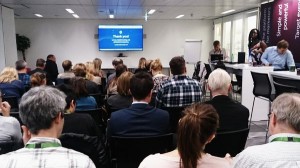Yesterday I attended my first UK Not-for-profit Salesforce User Group event, and I’m happy to say I hope it won’t be my last. The events are currently organised by Julia Whitehead of Give Clarity and Faith Williams of ShoNet. This particular event was hosted at the lovely dotmailer offices in London Bridge.
The event kicked off with a small pitch from dotmailer, something which I’ve come to expect from meetups and events like this. I can’t begrudge them too much, floor space in the city certainly doesn’t come for free.
Peter Ransom : The Officers’ Association
Up next was Peter Ransom from The Officers’ Association. The OA promote the welfare of those who have held a commission, in HM Armed Services, and their families. Peter gave an enjoyable and informative walk-through of their Salesforce implementation project It included info on why they chose Salesforce in the first instance, some of their results and some lessons that they had picked on their journey. Before starting their integration project they ran a very paper-based business, with desks piled high with folders and stacks of paper… not the most efficient setup in this day and age. Peter highlighted the following results of their implementation;
- 70% reduction in printing/photocopying costs
- 30% reduction in administration costs
As well as talking through some of the architectural decisions Peter also ran through a set of ‘lessons learned;
- Ensure good communication with end users. Assumptions from management aren’t always true and if end users are involved at an early stage then they tend to feel they also ‘own’ part of the project, and this can greatly help in removing friction and increase acceptance of change.
- Set aside enough ‘snagging’ time. There will always be things you overlook.
- Regularly review requirements. Peter said there project used an agile-esq approach and this review of requirements was useful.
- Ensure SFDC knowledge is up to date.
Justin Halfpenny : MobileCaddy
Our CEO, Justin, was presenting the second talk. This was entitiled Delivering Enterprise Mobility. It was as much about getting the audience to ask themselves about their own views on Enterprise Mobility as it was about anything else. You need to start thinking about some of the issues that are fundamental to delivering an excellent mobile offering, but are often forgotten about when the journey begins. The earlier you’re aware of what factors and pitfalls are present in the mobile ecosystem, the better. People tend to be focused on getting an app up and running, but thinking about it’s lifecycle is equally, if not more, important. How does it work when offline? What happens when the organisation purchases new devices? What happens when the OSs upgrade automatically?

Justin started off by addressing these 3 questions;
- Who?
- Why?
- How?
The Who? deals with who are we talking about? Who is mobile and which organisations can take advantage of the move to mobile? The Why? asks what is driving organisations to embark on a mobile strategy and the How? focussed on how to start and how to make it work? The slides can be found here.
Kevin Bromer : NGO Connect Roadmap
Last up was a remote presentation from Kevin Bromer, a Solutions Architect at the Salesforce.com Foundation. This was focused on NGO Connect and the NFP Starter Pack. To be honest the content was somewhat dry and I had really hoped for more. That’s not to say that what you get with NGO Connect and the NFP Starter Pack isn’t pretty amazing, I think it is, it’s just that demoing the standard Salesforce UI is a bit underwhelming. If you’re interested then I suggest you head over to SalesforceFoundation.org to find out more about both products.
Wrap Up
Many thanks go to Julia and Faith and dotmailer for hosting, and the Salesforce foundation who funded the nibbles and drinks. There have historically been about 3 events a year, so keep your eyes peeled as I recommend going to one.